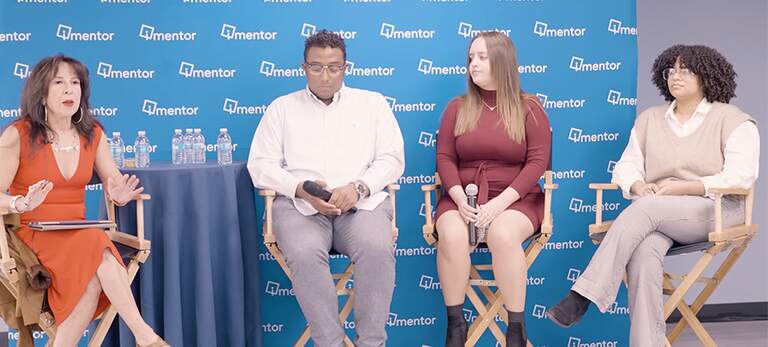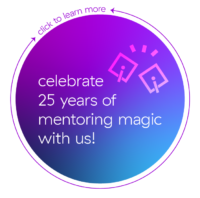Emmy Award-winning journalist Maria Hinojosa moderates "The Next Generation to Drive Change," a discussion panel with iMentor alumni
Since its inception in 1999, iMentor has served nearly 38,000 students across the country. Today, many of these incredible individuals are now members of the workforce, drivers of change in their communities, and proud iMentor alumni.
On Oct. 28, Emmy Award-winning journalist Maria Hinojosa caught up with three iMentor NYC alumni, and they had a lot to share. At "The Next Generation to Drive Change," a panel discussion broadcast on Zoom, James Breton, Ashlyn Rosario and Luisais Taveras talked about what they’re up to now, reminisced about their first impressions of their mentors, and, on the heels of Hispanic Heritage Month, shared insights about their journeys as first-generation Latinx college students.
"Latinos and Latinas birthed here—not immigration—accounted for half of the population growth in the United States [in the last census],” said Hinojosa during the opening presentation. “The three students here are not just representative of this community, but of the future of the United States. Latinos and Latinas are the second largest voting block in the U.S. When iMentor is helping students get to this point, it’s not just great for them—we’re so thrilled about what you have achieved. It’s good for our entire country. It’s good for democracy. It means that our country is going to be better and better.”
Without question, James, Ashlyn and Luisais are well on their way to becoming visionaries and changemakers who will improve our society for all.
James, for instance, a first-generation college student whose family is from the Dominican Republic, received both a bachelor’s and master’s degree at Stony Brook University and is now pursuing a Ph.D. in chemistry at Yale University. Struck by the gap in opportunity and representation for students of color in the sciences, he joined a community on Twitter of people of color in the STEM field (@BlackInChem). He is interested in researching this disparity, becoming a civically engaged scientist, and creating more paths for people of color in academia.
James credits his mentor, Kyle, with helping him create a vision for his future. “Kyle helped me focused on what I should do when I got to college. He kept me thinking about not just finishing my degree, but thinking about what to do with it next," said James. (Read more about James' path to Yale.)
For Ashlyn, who grew up in Manhattan’s Lower East Side and is now pursuing her passion for both business and the arts at the business school at SUNY Albany, her mentor was pivotal in helping her become comfortable in a professional environment. "I had the wonderful opportunity to do an internship at Morgan Stanley,” she said. “[My mentor] was the perfect person to ask: 'How do I carry myself in a professional setting?' She would coach me on how to talk to senior managers, which I had never done before. I was 15 years old at the time. She helped me build my confidence within that setting." (Learn more about Ashlyn's experience as a first-generation college student.)
Luisais, now a senior at Hunter College, appears to accomplish more in 24 hours than most people do in a week, and she has the enthusiasm and positive energy to match. Luisais took 18 credits this past spring, majoring in clinical psychology and minoring in women and gender studies. She is on track to complete a certificate in human rights while pursuing a mini concentration in Japanese culture.
With ambition and drive already rooted in her DNA, Luisais found the true benefit of her mentor was in helping her slow down and consider whether she was investing her time and energy in pursuits that actually fulfilled her and made her happy.
"Lori's only expectation was for me to achieve a happiness that wasn’t attached to awards, that wasn’t attached to merit, that wasn’t attached to recognition. For me to achieve such a sense of self that I was unapologetic in who I was,” said Luisais. “Without her, I don’t think I would be who I am today.” (Read about Luisais' relationship with her mentor.)
As the students shared their stories, Hinojosa noted that an emerging theme was that mentors were able to provide transformational to support to students even without holding degrees in their same field or having specialized skills in any certain area.
“If you want to be a mentor, you don’t have to worry, ‘I’m not good at chemistry!’ It’s about, ‘are you a good person?’” she said.
Indeed, the session concluded with a reminder that iMentor is actively recruiting male-identifying mentors, especially in NYC and Chicago, for this school year. If you know someone who might be a great match to support students like James, Ashlyn, and Luisais, learn more about becoming a mentor.

